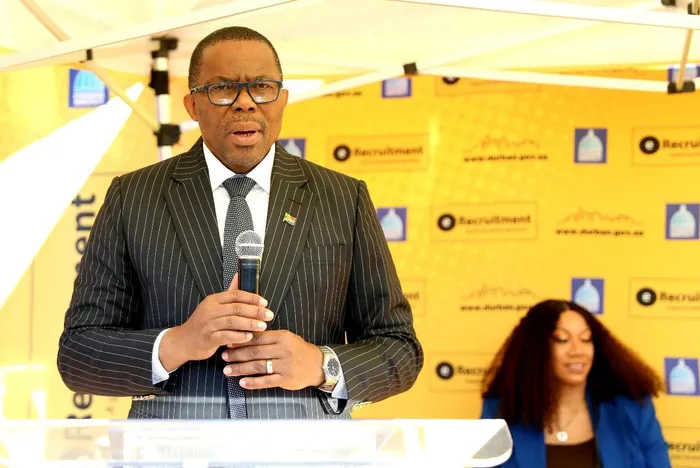eThekwini Municipality to harness technology to improve service delivery

eThekwini Mayor Cyril Xaba said the City will be using technology to improve service delivery.
Image: eThekwini Municipality / Facebook
The eThekwini Municipality will deploy drones in an effort to identify and quickly address service delivery issues in the City. eThekwini mayor Cyril Xaba stated that the City no longer wants to wait for residents to complain about the service delivery challenges they are experiencing in their areas.
Xaba emphasised that matters like water leaks and potholes must be identified urgently through the use of technology and addressed quickly, rather than being left unresolved for weeks or months.
Xaba made these remarks while speaking at the Municipal Innovation Awards in Durban yesterday afternoon.
The second Municipal Innovation Recognition Awards (MIRA) is an initiative of the Department of Science, Technology and Innovation (DSTI), the University of KwaZulu-Natal (UKZN), and the South African Local Government Association (SALGA).
It follows the implementation of the Municipal Innovation Maturity Index in 2021, a tool that assesses the capacity of municipalities to innovate in a bid to improve service delivery. The awards are also a flagship initiative of the Viability and Validation of Innovations for Service Delivery Programme, which supports municipalities in piloting specific technologies or innovations, focusing on aspects like access, availability, acceptability, and adaptability of these solutions in basic service delivery.
Award categories included Special Recognition Awards, Top Innovative Municipality, and the Trailblazing Innovations Award for Innovations for Service Delivery.
Several municipalities across the country took part in yesterday’s ceremony. Among those present were eThekwini, the City of Cape Town and representatives from municipalities in Gauteng, the Eastern Cape and Limpopo.
Xaba stated that the use of technology is central to how municipalities must be run. “Innovation within local government is not merely a technical endeavour, but it is a governance imperative that bridges the gap between policy and the lived realities of communities. Research consistently affirms that municipalities that embed a culture of learning are more resilient and better positioned to respond to complex developmental challenges.”
He said the municipality was committed to institutionalising innovation as a strategic tool for service delivery. “I am happy that as a city, we have taken the decision to deploy technology, including utilising drones to proactively identify and resolve service delivery challenges. As we strive to improve performance, this will go a long way in ensuring that we don’t wait for communities to report faulty streetlights, burst pipes, and overgrown verges.”
SALGA president Bheke Sofile applauded the programme, stating that it is pleasing to see the UKZN, SALGA, and the government working together to address challenges. He expressed concern about the lack of innovation in municipalities and highlighted the importance of collaboration with academics to improve the lives of people in the country. He said innovation was necessary, especially in municipalities with low resources.
“Let us co-create solutions. MIRA represents a sector with the potential and talent to transform itself from within. Let us share what works, document what does not, collaborate and share solutions.”
The Trailblazer Awards recognised several municipalities for their innovative projects aimed at improving local governance and community engagement.
- The City of Cape Town received the award for their Digital Wayleave Management System. This system consolidates and standardises requirements from multiple departments into a unified, web-based one-stop platform.
- The City of Ekurhuleni was recognised for taking decisive steps to address non-revenue water. Through a proactive, data-driven approach, the city deployed advanced leak detection technologies to identify, prioritise, and repair infrastructure faults across its water network.
- Polokwane Local Municipality was awarded for the My Polokwane Citizen App, which brings municipal services directly into the hands of residents.